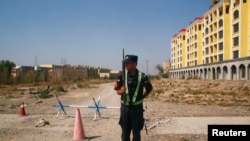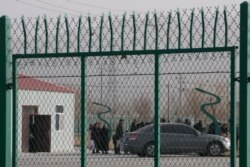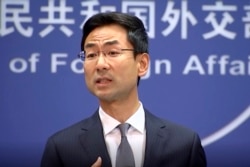Uighur activists and experts expressed optimism about the U.S. position on the ongoing plight of Uighurs in China and abroad, following a statement made by U.S. Secretary of State Mike Pompeo.
In a statement released Tuesday by the State Department, Pompeo said the U.S. is still "deeply troubled" by reports that the Chinese government has "harassed, imprisoned, or arbitrarily detained family members of Uighur Muslim activists and survivors of Xinjiang internment camps who have made their stories public."
U.S.-based activist Ferkat Jawdut, who was mentioned in the top U.S. diplomat's statement, told VOA that making such statements from the U.S. government gives hope to Uighurs that they are not alone.
"It's really great to see how much the current U.S. administration is doing to help close those camps and restoring the freedom of Uighurs in China, the U.S. and around the world," he said.
Internment camps
Over the past few years, the Chinese government has established complexes in the Xinjiang region in northwest China that it maintains are "vocational training centers" designed to combat terrorism and extremism and to teach new skills.
There are an estimated 13 million Uighurs and other Turkic Muslim minorities living in Xinjiang. The Chinese government has faced growing criticism from the international community over the detention of Uighurs.
In some cases, abuses by the Chinese government against Uighur Muslims occurred shortly after meetings between senior State Department officials and Uighur activists from Xinjiang, Pompeo said in his statement.
China reaction
Chinese officials deny any mistreatment of the Uighurs and maintain that the detainees are at the complexes voluntarily.
"I'd like to stress that there are no so-called 'internment camps' in Xinjiang," Geng Shuang, a spokesman for China's Foreign Ministry, said during a press conference Wednesday.
"Under the pretext of human rights, the U.S. has once again smeared China's Xinjiang policy and made fact-distorting comments," Shuang added, referring to Pompeo's Tuesday statement.
Jawdut, whose mother has been in a Chinese internment camp since 2017, said that "having the U.S. on our side" will help raise awareness about human rights violations committed by China against the Uighur people.
"Secretary Pompeo's statement is reassuring that we are not alone in this fight against the atrocious crimes committed by the Chinese regime to Uighurs living in China and abroad," he told VOA in a phone interview.
Jawdut recounted a recent attempt by the Chinese government to intimidate him, saying, "Chinese state security agents added me on their Wechat social media account and told me that I was going against a world superpower and that I and my mother, who's living under China's brutal treatment, would be easily crushed."
He added that Chinese agents asked him to "cooperate" with them, and "in return, they would help with the release" of his mother and other relatives from internment camps.
"After I rejected their offer, they relocated my uncle and aunt from re-education camps to prison," Jawdut said.
Raising awareness
Uighur activist Alfred Erkin said Pompeo's words have encouraged him to carry on his advocacy for the Uighurs.
Erkin said that in September 2018, he learned both his parents had been taken into Chinese government custody. His father, a reporter for the state-run television, had already been imprisoned for over six months, while his mother, a public school teacher, had already been in an internment camp for nearly one year.
"I felt so sad that even though both my parents, government employees and law-abiding citizens, were not able to save themselves from China's brutal crackdown against us," Erkin told VOA.
Since then, he said he has made it his main mission to raise awareness about his family's situation and be a voice for "millions of voiceless Uighurs living in Chinese re-education camps, prisons and under surveillance."
Erkin noted he has met with Pompeo to talk about the "plight of Uighurs" in China.
He has also "spoken to media outlets and given testimonies to the U.S. government and the U.N."
Uighur activist Zumrat Dawut has also experienced the internment camps firsthand.
"I am one of the very few survivors and witnesses of China's brutal and inhumane policies and treatment of Uighurs through re-education camps," Dawut added.
Dawat spent more than two months in a Chinese internment camp in 2018, until her Pakistani husband helped secure her release.
U.S. role
The U.S. government and human rights groups estimate 10% of the Uighur population is under detention.
In its 2018 Country Reports on Terrorism, the State Department last week said China's primary counterterrorism focus remained on Uighurs.
"Using counterterrorism as a pretext, [the Chinese government] has detained more than one million Uighurs and members of other Muslim minority groups in camps" in Xinjiang since 2017, the State Department report said.
Rights experts say the U.S. has the capacity to mobilize global opinion against China's policies on the Uighurs.
"What is required is the determination to build a worldwide coalition to exert pressure against Beijing to change its policies, close the incarceration and indoctrination camps, and respect the rights of the Uighurs," said Phil Robertson, Deputy Asia Director at Human Rights Watch.







